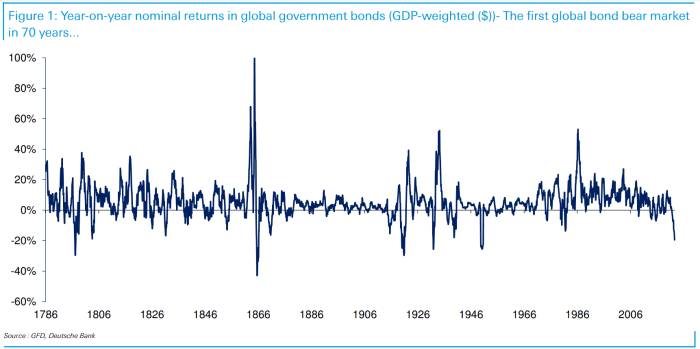This post was originally published on this site
It’s been a terrible year for financial markets and perhaps even more so when you weigh 2022 against more than two centuries of data.
Global bonds are now in their first bear market in 76 years, after having dropped 20% from their peaks, according to Deutsche Bank research dating back to 1786. The last time global bonds fared so poorly was in 1946, the year that the first session of the United Nations was held in London after the end of World War II.

Source: GFD, Deutsche Bank
Driving much of the brutal selloff in global bonds, which has sent yields soaring across developed markets, is expectations for much higher interest rates as central banks try to combat the highest inflation spell in 40 years. As financial-market players rush to factor in much higher rates, they’ve aggressively sold off government bonds — pushing yields to multiyear highs, particularly in the U.S.
Global government bonds have seen a decade’s worth of positive nominal returns wiped out, so far, based on a rolling 10-year return basis. “By the end of September 2022, this may be the worst rolling 10-year period for U.S. bonds in history,” Deutsche Bank researchers said.
“What makes this current period even worse historically is that we are now seeing deep losses in nominal terms which, for many countries, has never previously happened over a sustained period outside of wars or defaults,” said Deutsche Bank researchers Jim Reid, Henry Allen, Luke Templeman and Adrian Cox.
On Monday, investors and traders continued to sell off Treasurys, lifting the policy-sensitive 2-year yield
TMUBMUSD02Y,
further above its highest levels of almost 15 years. Meanwhile, the rate on 2-year gilts
TMBMKGB-02Y,
the U.K. counterpart to Treasurys, soared above 4.5% as Bank of England Gov. Andrew Bailey said policy makers will not “hesitate to change interest rates as necessary” to bring inflation down to 2%.

